TOP UPDATES FOUR PILLARS CINEMA/TV GAMES MANGA/ANIME MUSIC WRITINGS FAQ LINKS
TOP UPDATES FOUR PILLARS CINEMA/TV GAMES MANGA/ANIME MUSIC WRITINGS FAQ LINKS
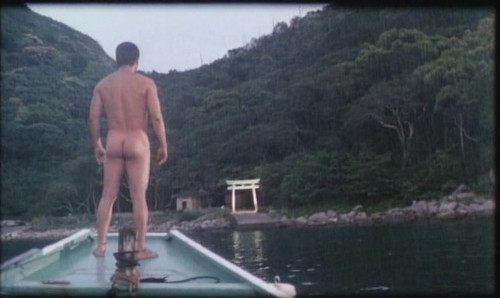
火まつり (1985) - 柳町光男
Himatsuri (1985) - Yanagimachi Mitsuo
Himatsuri by Yanagimachi Mitsuo is a very unusual film which is bound to polarize viewers. Like all great works of art, it seems possible of many interpretations which are possibly conflicting. The title Himatsuri is translated as "Fire Festival" and refers to a particular traditional religious rite that occurs at a point in the film. However, it seems that this film is referred to by its original, untranslated title and by the translation "Fire Festival" about equally. In cases like that, I always use the original language title. I have referenced this film on some occasions because I find it very useful for illustrating certain Japanese religious values and difficult problems related to them.
Himatsuri centers on a community in rural Mie Prefecture where we get the sense that spiritual traditions are very ancient and unchanged since time immemorial. However, some speculators are trying to buy land in the area to open a marine park and create commercial business. One figure at the center of this is a lumberjack named Tatsuo who refuses to sell his land despite mounting economic pressures. In general, he looks very negatively on the whole enterprise of opening up the village to business. But someone keeps ruining prospects for the developers by dumping oil into the village's fish hatcheries. Everyone suspects Tatsuo. Tensions between Tatsuo, the village, and the developers as the titular "himatsuri" or fire festival approaches.
Judging by this description, Himatsuri might sound like a pretty simple, almost overwrought ecological parable: The big bad capitalist developers who live out of touch with nature bully and intrude on the loving, happy people of the small village who live in peace and harmony with nature. Well, any expectation that things would be that simple is dashed in the very first scene of the film. It opens with a number of lumberjacks chopping down trees in the forest with chainsaws. If this was a simplistic film, these would be the obvious "bad guys," committing wanton violence against nature rather than being recipients of the ancient wisdom of forest and frolicking with fairies or something.
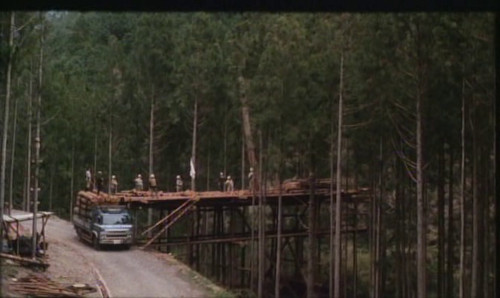
But this is not the case. Tatsuo, our main protagonist who opposes the marine park developers is one of these very lumberjacks who makes his living by cutting down trees. We see a lot of images of things like trees being felled and animal corpses fresh from the hunt. These men are traditionalists with regard to nature, sure. But pacifists? Absolutely not. And the one who perhaps stands at its head as the most "bloodthirsty" or willing to take from nature is Tatsuo, the one who is at the same time so opposed to the marine park.
It may sound like I am making too much of this. After all, we might take the message at first glance to be that the difference is a matter of sustainability. No one can avoid "using" the resources of nature to some degree if we want to survive, and especially in a "traditional" society. Sustainability never implied pacifism from the beginning. Some of the earliest American conservationists were also hunters. It makes sense, of course. To have a good hunt you need thriving animal populations, and to have thriving animal populations you have to exist in a give-and-take with the natural world. So it might seem at first glance like the message is simply that we should live within our means.
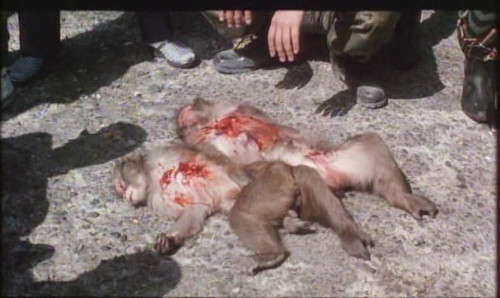
But I really must emphasize how much Yanagimachi misses no opportunity to show guns blasting and chainsaws whirring, to show trees being gored and felled, and especially to show dead animals being collected. One of the scenes in the film that many will have trouble watching is a scene near the beginning where Tatsuo is training his hunting dogs to maul and kill a wild boar, and nothing in it seems to be staged. So while we might say that yes, this kind of violence is "sustainable," there is something deeply unsettling about it in any case. And it seems very, very central to this movie to make us take note of that.
Namely, I think it directs us to the most uncomfortable truth about our existence: That violence is there from the beginning and seems to be, on some level, indelible and innate. The entire reason homo sapiens came to dominate the earth is that the other side of our evolution is the mass extinction of megafauna like ground sloths and mastodons. We have never lived in a Garden of Eden. To live in nature is to do violence to it.
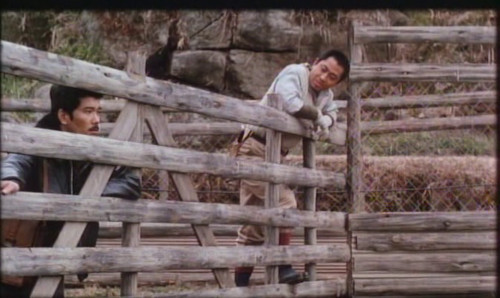
To me then, the film represents something quite uncomfortable and perhaps unsettling: That humans can never achieve equanimity with "nature," because to exist as an animal in the natural world rests on a whole background of violence and force. The difference here, as I see it, is not that the violence of the villagers is "sustainable" and that the violence of the industrialists is "unsustainable." The difference, as I see it, is that the violence of the villagers is OWNED. When you live their life, you cannot avoid being conscious of the violence you do to get your food, your home, and your leisure. The developers on the other hand are like a tank crushing an anthill. They have become so disconnected from nature that they can no longer even take ownership of their violence.
This is where, in my opinion, Himatsuri supplies us with a truly ancient and primal sense of spirituality. This film speaks to the purest essence of the Japanese Shintou spirit, before Buddhism or Confucianism were ever on the horizon. And what is that essence? That in living in nature we do violence to it, and yet we seek to be in harmony with it. That fundamental contradiction is the source of our desire to worship, to revere, and to become pure. And that most ancient sense of spirituality is what is abundant in the village of this film and put in danger by the marine park. The apex of this is found in Tatsuo.
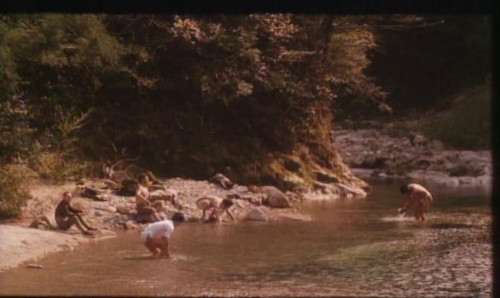
I want to emphasize how much Tatsuo is the complete opposite of the traditionally Japanese image of grace and nobility. One of the first lines he says in the film, while swimming in a mountain stream, is "Even my dick is getting small in this cold water!" And this sets the tone well. He is probably the one who is most in touch with nature in the film. And precisely for this reason he is often very "uncivilized." He is a man of the mountains and from the beginning exists in a close spiritual relationship with them. He deeply loves the goddess of the mountain, but his relationship with her is nothing like any modern religion. When he puts some colonge on, he says that the goddess of the mountain ought to appreciate it, since she's a woman and all.
This is not unheard of in modern Japan either. I remember being told, for example, that as a man I should avoid going to shrines with certain female deities with a girlfriend, as the female deity will be jealous and try to split us up. This is something that I believe is missing from most other religious traditions, which is a recognition of human-like emotion in deities. Of course it was the standard in Ancient Greece and the surrounding countries. But Japanese Shintou retains a bit of it. And it is at the most extreme in Tatsuo's case. There is not even a conception of "taking the lord's name in vain" here. He lives in such an intimate relationship with the goddess of the mountain that his every primal urge exists in relation with the divine.
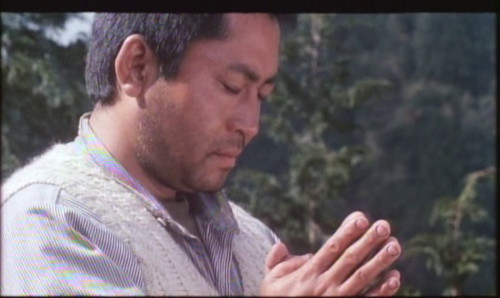
And yet, this does not mean that it is a free-for-all. There are laws in nature. But they are pre-rational. For example, Tatsuo becomes quite angry when one of his companions uses the sacred branches of a laurel tree to make a bird trap. Tatsuo punishes him by making him strip off his pants and expose himself to nature in a kind of humiliation ritual. Again, he claims that seeing his friend naked will please the goddess of the mountain because she is a woman. Tatsuo, to me, represents almost a sort of archetype or subconscious. He is the man who lives in a deeply sensual, instinctive union with the natural world.
It seems to me that in every Japanese gentleman with all his refinement and restraint, a Tatsuo of sorts lurks inside, which cannot forget the most primal and intuitive rules of lust and savagery but also of tenderness and warmth. He is the eternal monkey, the most traditional of all Japanese, more traditional than all their traditions. A lot of viewers will find him very off-putting. We are probably meant to, to a great degree. Because we don't want to admit that he lives more according to the rules of "nature" than the average shopper at Whole Foods. And it takes someone like him to make all the themes of the film clear.
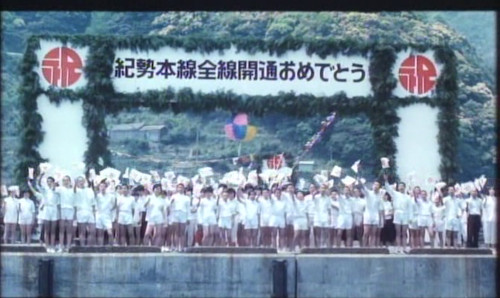
Is nature profoundly indifferent? Or does it have a justice of its own that we cannot perceive, any more than an ant can understand the stock market? This is an ancient question, and it lies at the heart of this film. It seems like no matter what the answer is, the worldview of this film remains quite ominous and grim. In order to explain the exact way this plays out, I need to discuss what happens in the rest of the film, and to do that I will need to talk about what happens in the film as the story progresses.
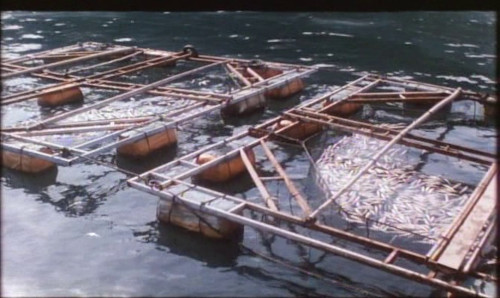
The marine park continues to develop in the small village. The main speculator in the film who urges Tatsuo and others to sell their land, Yamakawa, is a very dislikable character. He is an exploiter and a sleaze as well. But someone continues to dump fuel oil in the fish hatcheries to sabotage the possibility of the marine park developing. Tatsuo is of course the prime suspect, but no one knows how to do anything about it. The film continues in a leisurely fashion, but things slowly start to seem more and more disrupted. Young people in the city start enjoying modern dance music, motorcycles, and all the "civilization" of the marine park that seeks to uproot the village from its way of life. The sexual energies, there from the beginning and an essential part of natural life, become less harmonious as affairs and liaisons increase. The noise of the theme park echoes even into the quiet recesses of the forest. Something is deeply out of joint.
!!!---SPOILERS FROM THIS POINT ON---!!!
All of this culminates in an extremely haunting ending. I really do think you should avoid knowing about it before watching the film, but I do need to describe it. Eventually, the titular "himatsuri" or fire festival takes place and the village is abuzz. This is a traditional Shintou rite that is distinctive to the rural prefectures of the Kii Peninsula where worshippers brandish torches and make a march up to the holy site. The exact details of it are not particularly important for what is essential to the film, in my opinion. On the eve of the festival, Tatsuo and his fellow laborers are up in the mountains felling trees. An unexpected harsh downpour of rain breaks them up and drives them back down to the village. But one man, Tatsuo, stays behind.
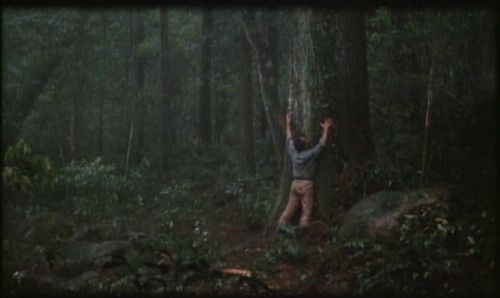
The next scene is perhaps the climax of the film. He embraces a huge, ancient tree in the intense downpour. The rain gives way to an intense gale. He then takes a deep drink from a sacred mountain stream (a deeply significant symbol of purification in Shintou). Though it is not spelled out in such simple terms, it seems clear that he has come into close contact with the goddess of the mountain. He returns to the village in time to see the festival beginning. But he soon realizes that a few breaches in ritual etiquette have been made and lashes out in anger. He disrupts the entire festival by getting into a violent fight with the other worshippers and punishing those who lacked the proper decorum. The next day, Tatsuo and his family are getting ready to perform a ritual of mourning on the anniversary of his father's death. While they are getting ready, Tatsuo grabs his shotgun and, one by one, murders his entire family without saying a word before putting the shotgun in his own mouth and pulling the trigger. The next morning, the hatchery has once again been defiled with oil. But who could have done it?
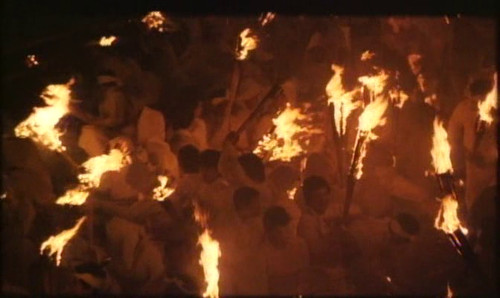
The shocking and deeply unsettling ending of the film leaves us with more questions than answers. But one thing seems clear: the natural order has somehow been disrupted and desecrated. Donald Richie interprets the ending as Tatsuo being "possessed" by the goddess of the mountain and becoming a tool to enact her vengeance. [1]. He and his family become a kind of sacrifice. But this is never quite made explicit. Has he been taken over by a divine force? Or simply gone insane with rage? The end with the continued spoiling of the hatchery is similarly ambiguous. Is it a copycat who has taken Tatsuo's place? Or the goddess of the mountain herself still exacting retribution for having her festival despoiled?
!!!---SPOILERS END HERE---!!!
I'm not one to try to capture the meaning of a film as complex and elusive as Himatsuri in a simple "moral" or "lesson." But I see it as being a profound expression of existing in a position of humility towards the natural world. Even if Tatsuo is brutish and dangerous, he seems to be the only one who still even recognizes the danger in forgetting this humility. The greatest danger is not recognizing that there is a danger at all, and that is the sorry state of most other chracters in this film. The film is ominous because it shows us how this humility by no means guarantees the things we seek most in our spiritual traditions: peace, restraint, manners, or even morality. But the most primal relationship, the one that the Shintou faith and all its descendents (meaning all religions) are born out of, is that humility to something larger than us.
Watch this film if you have an open mind and aren't very squeamish. You might hate it. A lot of people seem to. But in any case I promise it will give you a lot to think about.
1. Donald Richie, "Transgression and Retribution: Yanagimachi Mitsuo's Fire Festival", Nihon Cine Art. This review is excellent and provides some helpful background about the film's production and director's thoughts on it.